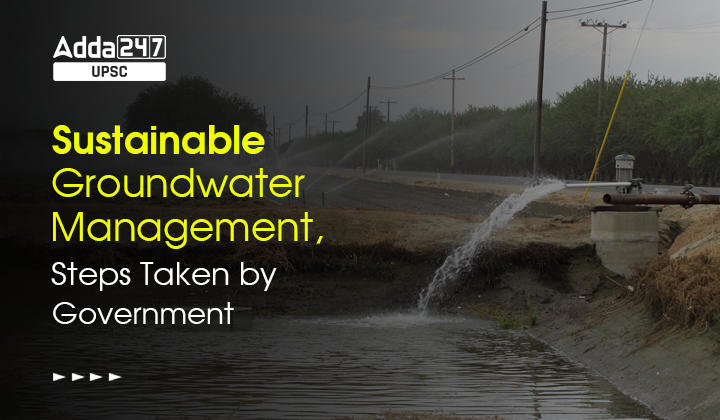Table of Contents
Sustainable Groundwater Management Initiatives: Groundwater is very important essential pubic good that should be used sustainably and not exploited. The government has taken many Sustainable Groundwater Management Initiatives for right use of the groundwater. Sustainable Groundwater Management Initiatives are also important for UPSC Prelims Exam 2023 and UPSC Mains Exam (GS Paper 3- Conservation and protection of natural resources).
Sustainable Groundwater Management Initiatives in News
Recently, the Minister of State for Jal Shakti, Shri Bishweswar Tudu in a written reply in Lok Sabha informed about many important Sustainable Groundwater Management Initiatives taken by the Union Government.
Management of Water in India
Water is a State subject under Part VII of the constitution. So, various initiatives on water management including conservation of water in the country is primarily States’ responsibility.
- Central Government supports the State Governments in their water management efforts by providing technical and financial support.
- The Union Government has taken many initiatives for the conservation sustainable use of water (especially groundwater) in the country.
- Sustainable groundwater management has become an important issue for the government due to the increasing demand for water resources and the depletion of groundwater levels in many areas.
Government Initiatives for Groundwater Management
The government has taken several steps to promote sustainable groundwater management. Here are some of them:
Atal Bhujal Yojana (ABY) scheme
The government has launched the Atal Bhujal Yojana (ABY) scheme to promote sustainable groundwater management. The scheme aims to improve the groundwater management in priority areas of seven states by involving local communities in the process.
National Aquifer Mapping and Management Programme (NAQUIM)
The government has also implemented the National Aquifer Mapping and Management Programme (NAQUIM) to identify and map aquifers across the country. This will help in understanding the groundwater availability and quality in different regions, and facilitate better planning and management of groundwater resources.
Central Ground Water Board (CGWB)
The Central Ground Water Board (CGWB) has been working to monitor and assess the groundwater levels across the country. The CGWB provides technical support and guidance to state governments for the sustainable management of groundwater resources.
Jal Jeevan Mission (JJM)
The government has also initiated the Jal Jeevan Mission (JJM) to provide safe and adequate drinking water to rural households. The JJM focuses on water source sustainability, groundwater recharge, and greywater management.
Har Khet Ko Pani (HKKP)
Har Khet Ko Pani (HKKP) is a part of the Pradhan Mantri Krishi Sinchayee Yojana (PMKSY) with the goal of expanding cultivable land by improving and restoring water bodies. The Surface Minor Irrigation (SMI) and Repair, Renovation & Restoration (RRR) of Water Bodies schemes aim to increase the storage capacity of tanks and revive lost irrigation potential, resulting in improved water use efficiency, groundwater recharge, increased availability of drinking water, and catchment improvement of tank commands.
Regulation for Sustainable use of Groundwater
The government has developed guidelines for the regulation of groundwater extraction to ensure its sustainable use. The guidelines provide a framework for the allocation of groundwater resources, and promote efficient use of groundwater.
Use of Innovative technologies for Groundwater Management
The government has encouraged the use of innovative technologies for groundwater management, such as artificial recharge of aquifers, rainwater harvesting, and use of treated wastewater for irrigation.
Conclusion
Overall, the government’s initiatives and steps towards sustainable groundwater management have been aimed at ensuring the equitable and sustainable use of groundwater resources for the benefit of all stakeholders, including farmers, industries, and communities.
Sustainable Groundwater Management Initiatives FAQs
Q. What is sustainable groundwater management?
A: Sustainable groundwater management refers to the management and conservation of groundwater resources in a manner that meets the needs of present and future generations while also maintaining ecological integrity.
Q. Why is sustainable groundwater management important?
A: Sustainable groundwater management is important because groundwater is a finite resource, and its unsustainable use can lead to depletion, reduced water quality, and damage to ecosystems that depend on it.
Q. What are some sustainable groundwater management initiatives?
A: Sustainable groundwater management initiatives may include policies and regulations, such as water-use restrictions or pricing mechanisms, as well as technologies and practices that improve water-use efficiency, such as precision irrigation or rainwater harvesting.
Q. How can individuals contribute to sustainable groundwater management?
A: Individuals can contribute to sustainable groundwater management by reducing water use, practicing water conservation, and supporting policies and initiatives that promote sustainable water management.
Q. What are the benefits of sustainable groundwater management?
A: The benefits of sustainable groundwater management include improved water availability and quality, increased water-use efficiency, greater resilience to drought and other water-related stresses, and improved ecosystem health.
Water issue in India: India to Try New Groundwater Recharge Methods
Water issue in India: India to Try New Groundwater Recharge Methods



 TSPSC Group 1 Question Paper 2024, Downl...
TSPSC Group 1 Question Paper 2024, Downl...
 TSPSC Group 1 Answer key 2024 Out, Downl...
TSPSC Group 1 Answer key 2024 Out, Downl...
 UPSC Prelims 2024 Question Paper, Downlo...
UPSC Prelims 2024 Question Paper, Downlo...




